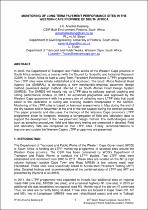 ResearchSpace
ResearchSpace
Monitoring of long-term pavement performance sites in the Western Cape Province of South Africa
JavaScript is disabled for your browser. Some features of this site may not work without it.
- ResearchSpace
- →
- Research Publications/Outputs
- →
- Conference Publications
- →
- View Item
| dc.contributor.author |
Anochie-Boateng, Joseph

|
|
| dc.contributor.author |
Van der Merwe Steyn, WJ

|
|
| dc.contributor.author |
Truter, L

|
|
| dc.date.accessioned | 2015-12-18T12:49:41Z | |
| dc.date.available | 2015-12-18T12:49:41Z | |
| dc.date.issued | 2015-11 | |
| dc.identifier.citation | Anochie-Boateng, JK, Van der Merwe Steyn, WJ, and Truter, L. 2015. Monitoring of long-term pavement performance sites in the Western Cape Province of South Africa. In: 32. Road pavements of the XXVth World Road Congress in Seoul, 2015, PIARC, Seoul, South Korea, November 2015, 13pp | en_US |
| dc.identifier.uri | http://hdl.handle.net/10204/8336 | |
| dc.description | Copyright: 2015 World Road Association (PIARC). 32. Road pavements of the XXVth World Road Congress in Seoul, 2015, PIARC, Seoul, South Korea, November 2015 | en_US |
| dc.description.abstract | In 2005, the Department of Transport and Public Works of the Western Cape province in South Africa entered into a contract with the Council for Scientific and Industrial Research (CSIR) in South Africa to start a Long-Term Pavement Performance (LTPP) programme. Two LTPP sites were initially established and monitored. The South Africa National Road Agency Ltd (SANRAL) is developing a new mechanistic-empirical pavement design method pavement design method referred to as South African Road Design System (SARDS). The SARDS will heavily rely on LTPP data to calibrate asphalt cracking and rutting performance models. In 2011, an expanded programme was approved by the Western Cape government with the primary aim of collecting more LTPP data that could assist in the calibration of rutting and cracking models incorporated in the SARDS. Monitoring of the LTPP sites is based on biannual assessments in May during the end of the dry season and in November at the end of the wet season. This paper presents and discusses the findings of the Western Cape province’s LTPP programme since its inception, showing a congregation of field and laboratory data to support the development of the new pavement design method. The methodologies used such as field sampling procedures, field and laboratory testing are presented in detailed. Field and laboratory data are compared for four LTPP sites. Recommendations to improve and sustain the Western Cape’s LTPP programme are presented. | en_US |
| dc.language.iso | en | en_US |
| dc.publisher | World Road Association (PIARC) | en_US |
| dc.relation.ispartofseries | Worklist;15943 | |
| dc.subject | Long-term pavement performance | en_US |
| dc.subject | LTPP | en_US |
| dc.subject | South African Road Design System | en_US |
| dc.subject | SARDS | en_US |
| dc.subject | South Africa National Road Agency | en_US |
| dc.subject | SANRAL | en_US |
| dc.subject | Pavement design | en_US |
| dc.title | Monitoring of long-term pavement performance sites in the Western Cape Province of South Africa | en_US |
| dc.type | Conference Presentation | en_US |
| dc.identifier.apacitation | Anochie-Boateng, J., Van der Merwe Steyn, W., & Truter, L. (2015). Monitoring of long-term pavement performance sites in the Western Cape Province of South Africa. World Road Association (PIARC). http://hdl.handle.net/10204/8336 | en_ZA |
| dc.identifier.chicagocitation | Anochie-Boateng, Joseph, WJ Van der Merwe Steyn, and L Truter. "Monitoring of long-term pavement performance sites in the Western Cape Province of South Africa." (2015): http://hdl.handle.net/10204/8336 | en_ZA |
| dc.identifier.vancouvercitation | Anochie-Boateng J, Van der Merwe Steyn W, Truter L, Monitoring of long-term pavement performance sites in the Western Cape Province of South Africa; World Road Association (PIARC); 2015. http://hdl.handle.net/10204/8336 . | en_ZA |
| dc.identifier.ris | TY - Conference Presentation AU - Anochie-Boateng, Joseph AU - Van der Merwe Steyn, WJ AU - Truter, L AB - In 2005, the Department of Transport and Public Works of the Western Cape province in South Africa entered into a contract with the Council for Scientific and Industrial Research (CSIR) in South Africa to start a Long-Term Pavement Performance (LTPP) programme. Two LTPP sites were initially established and monitored. The South Africa National Road Agency Ltd (SANRAL) is developing a new mechanistic-empirical pavement design method pavement design method referred to as South African Road Design System (SARDS). The SARDS will heavily rely on LTPP data to calibrate asphalt cracking and rutting performance models. In 2011, an expanded programme was approved by the Western Cape government with the primary aim of collecting more LTPP data that could assist in the calibration of rutting and cracking models incorporated in the SARDS. Monitoring of the LTPP sites is based on biannual assessments in May during the end of the dry season and in November at the end of the wet season. This paper presents and discusses the findings of the Western Cape province’s LTPP programme since its inception, showing a congregation of field and laboratory data to support the development of the new pavement design method. The methodologies used such as field sampling procedures, field and laboratory testing are presented in detailed. Field and laboratory data are compared for four LTPP sites. Recommendations to improve and sustain the Western Cape’s LTPP programme are presented. DA - 2015-11 DB - ResearchSpace DP - CSIR KW - Long-term pavement performance KW - LTPP KW - South African Road Design System KW - SARDS KW - South Africa National Road Agency KW - SANRAL KW - Pavement design LK - https://researchspace.csir.co.za PY - 2015 T1 - Monitoring of long-term pavement performance sites in the Western Cape Province of South Africa TI - Monitoring of long-term pavement performance sites in the Western Cape Province of South Africa UR - http://hdl.handle.net/10204/8336 ER - | en_ZA |





